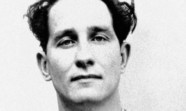Fifty years ago this morning, the Glasgow-Euston mail train was stopped and relieved of millions of pounds of used banknotes. Caroline Lindsay looks back on one of the most audacious crimes in British history.
On August 8, 1963 a gang of robbers, masterminded by Bruce Reynolds, stopped the Glasgow-Euston overnight mail train which was carrying huge numbers of used banknotes as it passed through the Buckinghamshire countryside.
Twelve of the robbers were jailed for a total of more than 300 years but more than one broke out of prison, including Ronnie Biggs, who spent more than 30 years on the run before he returned to Britain in 2001 to face arrest.
Reynolds returned in 1968, five years after the crime, and was captured in Torquay and jailed for 25 years. He died in February this year.
Last month Biggs insisted he was proud to have been part of the gang. The famous fugitive, who will celebrate his 84th birthday tomorrow, has few regrets about the crime that made him a household name: “If you want to ask me if I have any regrets about being one of the train robbers, my answer is, ‘No!’.
“I was there that August night and that is what counts. I am one of the few witnesses, living or dead, to what was the ‘Crime of the Century’.”
But he admitted he does have some regrets: “It is regrettable, as I have said many times, that the train driver was injured,” he said. “And he was not the only victim. The people who paid the heaviest price for the Great Train Robbery are the families. The families of everyone involved in the Great Train Robbery, and from both sides of the track.”
Biggs and Reynolds assembled a gang of at least 15 men for the job they called the “big one”.
But a series of blunders nearly spelled disaster and led ultimately to the capture of most of the gang.
The train appeared shortly after 3am and stopped at a set of fake signals the gang had put up. The driver, who got out to see what was going on, was coshed over the head and knocked senseless. But the gang found it impossible to unload the cash and the train driver they had brought along with them, recruited by Biggs, couldn’t work the controls of that particular train.
The train was driven a mile-and-a-half down the line where the gang unloaded £2,631,684 in used notes worth around £46 million today.
They then took the cash 25 miles by lorry to Leatherslade Farm, bought with the help of a crooked solicitor, where they planned to hole up until the heat died down.
But their warning to the handcuffed train staff not to do anything for 30 minutes as they made their getaway was the clue that helped detectives to work out that the gang was probably hiding within a radius of about 30 miles of the crime scene.
As the police closed in, the robbers divided the money and fled.
Malcolm Fewtrell, the police officer who led Buckinghamshire CID at the time, died in November 2005 at the age of 96.
Before his death, he said he thought four robbers had got away with their part in the crime: “These were dedicated, professional criminals and it was all organised, but it could have failed at any time. We knew who they were but there was nothing on them.”
